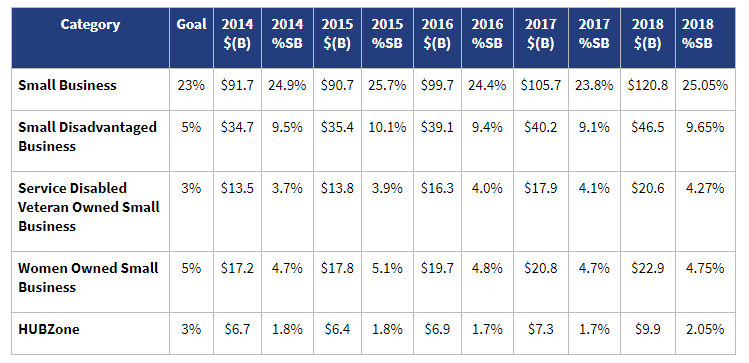Self Certification — No More ;-(
The 2015 National Defense Authorization Act mandated that the Small Business Administration (SBA) discontinue self-certification of women-owned and other small businesses. In 2020, SBA plans to finalize a self-certification rule that closes a loophole allowing participants in the SBA’s Women-Owned Small Business (WOSB) program to self-certify. (Federal News Network, June 2019)
Approximately one-quarter of all federal contracts are held by small businesses, which over the past six years has helped federal agencies to exceed SBA’s governmentwide small business contracting goal. This year’s spending of more than $120 billion on small business contracts surpasses last year’s spending by nearly $15 billion.
The Government Accountability Office reported in March that almost 40 percent of WOSB-certified businesses were ineligible. Meanwhile, SBA’s Office of Inspector General June 2018 audit found 89 percent of sole-source (50 out of 56 contracts) did not meet all program criteria. Basically, there is currently no way to know if the contracts, listed in the chart below, were actually eligible for the sole-source awards. (ibid)

Rob Wong, SBA’s associate administrator of the Office of Government promotes a formal certification to give the program some much-needed integrity. Wong said, “simply put, the wrong companies were receiving our contracts, we want to make sure that, if a company receives a contract through these programs, they’re actually eligible to receive it.” (ibid)
SBA has subsequently published a proposed rule in the Federal Register eliminating self-certification and providing a free online certification application to WOSB. Comments on the proposed rule are being accepted until July 15. In Wong’s opinion, it is high time to streamline the vetting process for the many other set-aside programs, all of which have different sets of eligibility criteria. Wong feels that going to three formal certifications for 8(a), Historically Underutilized Business Zones, women-owned, and service-disabled veterans will unify the processes. The rule with set-aside screening is expected to take a year for the changes to take effect. (ibid)
